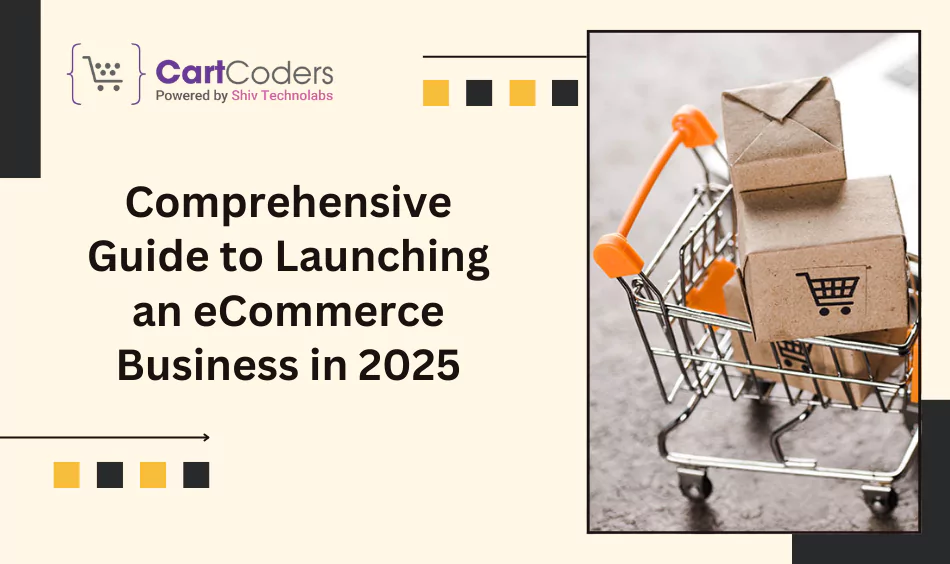Custom Engagement Solutions
Unlock tailored solutions with a free, no-obligation strategy session.
Expert Developers & Engineers on Demand
Scale Your Team with Skilled IT Professionals
Expert Guidance for Digital Transformation

An eCommerce website allows businesses to reach a global audience, sell products efficiently, and scale their operations over time. Whether launching a small startup or a large online store, following the right approach increases the chances of long-term success.
Starting an online store requires understanding consumer behavior, identifying market demand, and selecting the best tools to build a strong foundation. This guide breaks down the steps to start an eCommerce business from scratch, helping new entrepreneurs make informed decisions.

Before launching an eCommerce business, it is essential to understand the industry, market trends, and customer expectations. The online marketplace is highly competitive, but businesses that offer value, convenience, and a seamless shopping experience can thrive.
The eCommerce industry has witnessed remarkable growth over the past decade, driven by technological advancements and shifting consumer behaviors. In 2024, global eCommerce sales are projected to reach $6.09 trillion, reflecting an 8.4% increase from the previous year. This upward trajectory is expected to continue, with forecasts estimating sales to surpass $7.57 trillion by 2027.
As consumers increasingly prefer online shopping, businesses have greater opportunities to sell products globally. Advancements in technology, enhanced logistics, and secure payment gateways have simplified the process for entrepreneurs to create eCommerce websites and reach a wider audience.
Online shoppers expect fast, reliable, and personalized experiences. Some key factors that influence purchasing decisions include:
Launching an online store requires several essential elements:
While the online business space offers many benefits, there are also challenges to consider:
The demand for online shopping continues to grow, presenting a strong opportunity for new entrepreneurs. The availability of user-friendly eCommerce platforms, easy payment solutions, and digital marketing tools simplifies the process of launching and managing an eCommerce website for your business.
By understanding the market and planning accordingly, entrepreneurs can take the right steps to establish a successful online business.

Starting an eCommerce business in 2025 offers numerous opportunities due to technological advancements and changing consumer behaviors. Let’s break down a step-by-step roadmap to help you navigate the process effectively.
Selecting a specific market segment is crucial for standing out in the competitive online landscape. Focus on areas that align with your interests and expertise, ensuring there’s sufficient demand. Utilize tools like Google Trends and Amazon Best Sellers to gauge market interest and identify gaps that your business can fill.
A well-chosen niche helps in targeting the right audience and increasing the chances of success.
Also Read: How to Build a Website Like Amazon: Steps, Features, and Costs
Understanding market trends and consumer behavior helps in making informed business decisions. Conducting proper research allows businesses to predict demand, avoid common pitfalls, and plan a strong entry strategy.
1. Customer Behavior: Identify purchasing habits, preferences, and concerns.
2. Competitor Analysis: Review product offerings, pricing models, and marketing tactics.
3. Search Trends: Use keyword research tools to check trending products.
4. Pricing Strategies: Compare pricing across competitors to find the right balance.
Proper research minimizes risks and lays the groundwork for a successful business.
The success of an eCommerce business depends on selecting the right business model. Entrepreneurs can choose from multiple options based on investment capacity and operational control.
Each model has its benefits and challenges. The right choice depends on business goals, available resources, and long-term plans.
Also Read: How To Start A Dropshipping Business
Building an effective eCommerce website for your business requires selecting the right eCommerce platform and setting up a well-structured store.
1. Choose an eCommerce Platform:
2. Register a Domain Name: Choose a name that reflects your brand.
3. Set Up Website Hosting: If not using a hosted eCommerce platform, get reliable hosting.
4. Design the Website: Select a theme and customize it to match the brand identity.
5. List Products: Add product descriptions, images, and pricing.
6. Set Up Essential Pages: Include About Us, Contact, and Return Policy pages.
A well-structured eCommerce website improves user experience and builds customer trust.
Also Read: Custom vs. Pre-Built eCommerce Platforms: Which is Right for Your Business?
Product sourcing plays a major role in business success. Reliable suppliers and proper inventory management keep the business running smoothly.
A good inventory strategy prevents losses and improves order fulfillment efficiency.
Also Read: Effective Inventory Management Strategies for Shopify Stores
Branding helps an eCommerce business stand out in a crowded market. A clear brand identity attracts customers and builds loyalty.
A strong brand identity influences buying decisions and fosters long-term customer relationships.
A well-structured product page increases conversions and builds trust with customers. Every detail should encourage visitors to complete their purchase.
A strong product page makes it easier for customers to decide on a purchase.
Also Read: Shopify Product Page Design Audit: Best Practices for CRO
A secure payment system is critical for any eCommerce business. Customers prefer a variety of payment methods, so offering multiple options helps increase sales.
A seamless checkout process reduces cart abandonment and improves customer satisfaction.
Marketing is crucial for attracting customers to an eCommerce website. A strong strategy includes a mix of organic and paid tactics.
1. Search Engine Optimization (SEO): Helps rank higher in search results.
2. Social Media Marketing: Engages potential buyers on platforms like Facebook and Instagram.
3. Email Marketing: Keeps customers informed about new arrivals and promotions.
4. Paid Advertising: Uses platforms like Google Ads to reach targeted audiences.
5. Influencer Collaborations: Builds credibility through trusted voices.
A well-planned marketing strategy drives traffic and increases conversions.
Also Read: Shopify SEO: Ultimate Guide to Rank on Google’s #1 Page (2024)
Retaining customers is more cost-effective than acquiring new ones. Providing excellent support improves customer loyalty.
Happy customers are more likely to return and recommend the store to others.
Tracking business performance helps in making informed decisions. Key performance indicators (KPIs) show whether strategies are working.
Analyzing data regularly helps improve business strategies.
Once an eCommerce business gains traction, expansion becomes the next step. Growth strategies include adding more products, reaching new markets, and improving operations.
Scaling properly ensures consistent growth without compromising quality.
By following this comprehensive guide, you’ll be well-equipped to establish a successful eCommerce business in 2025. Stay adaptable, customer-focused, and committed to continuous improvement to thrive in the dynamic online marketplace.
Building a successful eCommerce business requires more than just setting up an online store. Businesses need a well-structured eCommerce website, seamless integrations, secure payment gateways, and marketing strategies that drive growth. CartCoders specializes in providing complete eCommerce solutions tailored to businesses of all sizes.
Whether you are launching a new online store or upgrading an existing one, CartCoders delivers complete eCommerce solutions that drive success. With expertise in development, customization, and marketing, businesses can confidently build, grow, and scale their digital presence.
Starting an eCommerce business in 2025 presents endless possibilities for entrepreneurs willing to plan strategically and execute effectively. From selecting a profitable niche to implementing digital marketing strategies, every step plays a crucial role in long-term success. By understanding market trends, building an eCommerce website, and offering a seamless shopping experience, businesses can thrive in the competitive online space.
For those looking to launch an online store with expert guidance, CartCoders provides tailored solutions to ensure smooth operations, secure transactions, and scalable growth. Whether it’s development, customization, or marketing, the right support can turn an idea into a thriving business. Now is the time to take action and build a successful eCommerce venture with CartCoders!
Projects delivered in 15+ industries.
95% retention rate, building lasting partnerships.
Serving clients across 25+ countries.
60+ pros | 10+ years of experience.